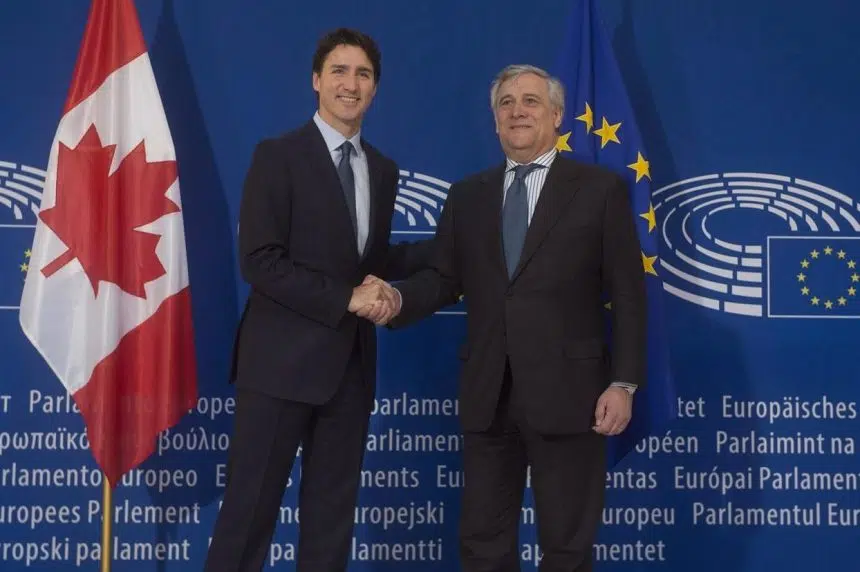MONTREAL — Lawmakers in France have begun their ratification of the comprehensive trade agreement between the European Union and Canada as Prime Minister Justin Trudeau welcomes the leaders of the 28-country bloc to Montreal on Wednesday.
Trudeau has been pushing hard for a win on trade and foreign policy after two difficult years marked by a rough renegotiation of the North American Free Trade Agreement with the Trump administration and the deterioration of political and trade relations with China.
Trudeau will talk up the merits of the Comprehensive Economic and Trade Agreement, or CETA, with European Council President Donald Tusk and European Commission President Jean-Claude Juncker in a series of events in Montreal over the next two days.
The group is to visit a pier in the bustling Port of Montreal, the gateway for European sea shipments into Canada.
International trade lawyer Lawrence Herman said that’s a welcome break from the resort-style backdrops that Trudeau and other prime ministers have preferred when they host international visitors.
“Appearing at the Port of Montreal in this era is much better than appearing at Lake Louise or Banff. The message we want to give is Canada is a leading economic force in the world,” said Herman.
“Meeting in Montreal or in any major urban centre gives that message much better than the typical image of Canada being a wilderness country full of mountains and streams.”
Wednesday’s legal development, the French National Assembly’s consideration of France’s CETA ratification bill, is also a prime focus for Canada’s Liberal prime minister, who will be fighting a federal election this fall.
Sources in France and Canada, who were not authorized to speak publicly about the talks, say Trudeau lobbied French President Emmanuel Macron for more than a year to introduce the bill, and that those efforts finally paid off last month in Paris during their most recent face-to-face meeting.
Almost all of CETA — in excess of 90 per cent — went into force in September 2017 under what is known as provisional application, but individual ratifications by EU member countries will bring it fully into effect.
That would mean a win for the international trading order that has been under assault by U.S. President Donald Trump.
“It’s an essential step. We’re very pleased with our co-operation with the French government,” International Trade Minister Jim Carr said in an interview.
Carr will be meeting his EU counterpart Cecilia Malmstrom in Montreal. He said the French move towards ratification is a significant step in Canada’s broader goal of diversifying Canada’s export markets.
Trudeau was in Paris in early June after attending the 75th anniversary commemorations of D-Day in France and Britain, and he and Macron emerged with news that France would move forward with CETA’s ratification. The introduction of the bill in the National Assembly is a first step in a process that the French government hopes will lead to full ratification by the end of 2019.
Macron and Trudeau have talked about the agreement repeatedly — in Paris in April 2018, in a telephone conversation a year later, and other face-to-face meetings. Macron is a staunch Europhile and open supporter of CETA, but he has had to tread cautiously because of populist opposition to trade deals in France and across Europe.
Canada has lobbied French lawmakers, businesspeople and farmers, an effort that included more than two dozen visits to various regions of France by Isabelle Hudon, the Canadian ambassador.
Trudeau also made a direct appeal to French lawmakers in an April 2018 speech to the National Assembly, the first time a Canadian prime minister addressed that body.
Earlier this week, Trump signed an executive order strengthening his protectionist Buy American Act, which requires federal agencies to increase their use of American-made products from 50 to 75 per cent.
Herman said Canadian companies need to be more aggressive in taking advantage of the new opportunities now open to them in Europe, especially its new “privileged” access to national and sub national government contracts in a sector valued at $3.3 trillion annually.
“As the U.S. turns inward and as protectionism raises its ugly face in the U.S. we have to look at other opportunities. And I think procurement is one of the areas where we have great possibility in Europe.”
CETA gives Canadian businesses preferred access to 500 million European consumers, and a $24-trillion market. In 2018, Canada’s exports to the EU increased by seven per cent to more than $44 billion.
But the Canadian Agri-Food Trade Alliance offered mixed reviews on the deal, saying EU agri-food exports to Canada jumped 10 per cent in 2018, compared with the previous year, which increased Canada’s trade deficit with the EU to $3.5 billion.
Meanwhile, Canadian agri-food exports to the EU have dropped 10 per cent since CETA’s 2017 entry into force, the alliance said.
Mike Blanchfield, The Canadian Press







